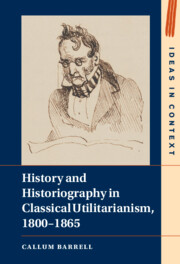Book contents
- History and Historiography in Classical Utilitarianism, 1800–1865
- Ideas in Context
- History and Historiography in Classical Utilitarianism, 1800–1865
- Copyright page
- Dedication
- Epigraph
- Contents
- Acknowledgements
- Conventions
- Introduction
- Part I Enlightened Historicisms
- Part II Historicism and Historiography
- Chapter 3 George Grote and Historismus
- Chapter 4 J. S. Mill’s Historical Criticism
- Part III Sciences of History
- Conclusion
- Bibliography
- Index
Chapter 3 - George Grote and Historismus
from Part II - Historicism and Historiography
Published online by Cambridge University Press: 24 September 2021
- History and Historiography in Classical Utilitarianism, 1800–1865
- Ideas in Context
- History and Historiography in Classical Utilitarianism, 1800–1865
- Copyright page
- Dedication
- Epigraph
- Contents
- Acknowledgements
- Conventions
- Introduction
- Part I Enlightened Historicisms
- Part II Historicism and Historiography
- Chapter 3 George Grote and Historismus
- Chapter 4 J. S. Mill’s Historical Criticism
- Part III Sciences of History
- Conclusion
- Bibliography
- Index
Summary
George Grote developed aspects of Bentham’s and James Mill’s philosophy into an endorsement of German Historismus, the fruits of which can be seen in his landmark History of Greece (1846–1856). While his historiography is associated more with James Mill than Bentham, Barrell argues that his conception of philosophical history more closely resembled Bentham’s science historique than James’s scale of civilisations, and that his attraction to German Historismus can be explained, at least partly, by his Benthamite logic; like Bentham, he stressed the past’s particularity and distinctness, in pursuit of which he embraced the hermeneutic, philological, and critical strands of Historismus. Greece’s ‘peculiarity’ provided opportunities for reflection without resorting to a vacuous presentism. His examination in the history of ‘democratical sentiment’ and ‘constitutional morality’ illustrated modern society’s comparative selfishness and the difficulty of reproducing those sentiments ex nihilo. The chapter ends by considering the ways in which J. S. Mill drew on these arguments to reconcile modern individuality with extensive civic duties.
Keywords
- Type
- Chapter
- Information
- Publisher: Cambridge University PressPrint publication year: 2021

